Saturday Evening Post History Minute: The Greatest Political Comeback in American History
Featured image: Warren Harding and Calvin Coolidge (Library of Congress)
11 Love Letters from Presidents That Will Make You Melt (or Blush)
We know that presidents have their hidden selves. But the love letters of some presidents show the unexpectedly romantic side of our chief executives. Here are excerpts from the love letters of eleven of our presidents.
- George Washington was known to be reserved and even austere, but one letter from June 23, 1775, hints at the warm (if not quite rising to “passionate”) feelings he directed to Martha.
I go [from Philadelphia] fully trusting in that Providence, which has been more bountiful to me than I deserve, & in full confidence of a happy meeting with you sometime in the Fall—I have not time to add more, as I am surrounded with Company to take leave of me—I retain an unalterable affection for you, which neither time or distance can change…
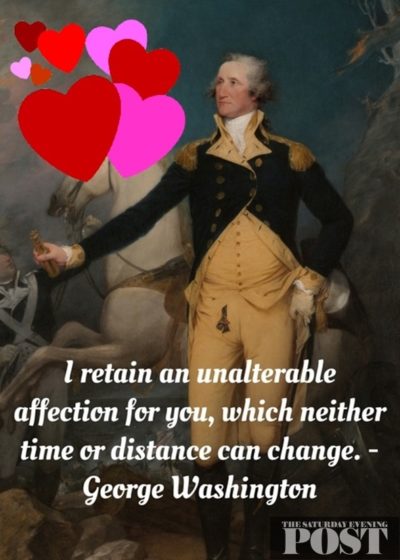
- John Adams, on the other hand, freely expressed his love for his wife, Abigail, who returned his feelings in a lively correspondence. Addressing one letter to “Miss Adorable” on October 4, 1762, he wrote:
By the same Token that the Bearer [Adams himself] hereof sat up with you last night I hereby order you to give him, as many Kisses, and as many Hours of your Company after 9 O’Clock as he shall please to Demand and charge them to my Account… I presume I have good Right to draw upon you for the Kisses as I have given two three Millions at least, when one has been received, and of Consequence, the Account between us is immensely in favor of yours.
- John Tyler’s photographs show nothing of the passionate man revealed in this December 5, 1812, letter to his fiancée, Letitia Christian, three months before their marriage:
From the first moment of my acquaintance with you I felt the influence of genuine affection; but now, when I reflect upon the sacrifice which you make to virtue and to feeling, by conferring your hand on one who has nothing to boast of, but an honest and upright soul and a heart of purest love, I feel gratitude super-added to affection for you. Indeed, I so esteem myself most rich in possessing you… to ensure your happiness is now my only object — and whether I float or sink in the stream of fortune, you may be assured of this, that I shall never cease to love you. Suffer me to assure you of my constant esteem and affection, and believe me to be Yrs. Most affectionately, John Tyler
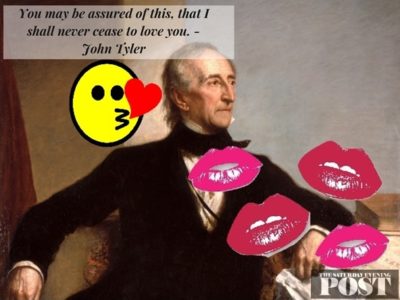
- Chester A. Arthur appears to have been a devoted spouse to Ellen Lewis Herndon. Here is his birthday letter to her from August 30, 1857:
This is your birth-day — my own precious darling — my own Nell. The remembrance came with my first waking in the early morning — as the thought of you always does and as I kissed your dear image, darling, my heart was full to overflowing with love and prayer for you!
How full of joy and happiness the world seemed to me, for I felt that you are my own Nell — that you love me!
I was happy and thanked God that he had so blessed me!
I would that the next [birthday] may find me with you, and that I may tell you all I would wish, all that my heart is now too full for me to write. — My heart is full indeed for my thoughts have been of your all the day.
Good night. May God bless and keep you always my darling.
Your own Chester
- On October 7, 1880, Theodore Roosevelt wrote to his nineteen-year-old fiancée Alice Lee of his love.
Oh my darling, I do so hope and pray I can make you happy. I shall try very hard to be as unselfish and sunny tempered as you are, and I shall save you from every care I can. My own true love, you have made my happiness almost too great; and I feel I can do so little for you in return. I worship you so that it seems almost desecration to touch you, and yet when I am with you I can hardly let you a moment out of my arms. My purest queen, no man was worthy of your love; but I shall try very hard to deserve it, at least in. Goodbye, my own heart’s darling. Your Loving Thee
- Woodrow Wilson’s first met Edith Bolling in 1915, and fell head-over-heels in love. He was so infatuated that he would break into a dance, singing “Oh, You Beautiful Doll.” Teddy Roosevelt, who despised Wilson, wouldn’t believe it. He said, “No evidence could ever make the American people believe that a man like Woodrow Wilson, cast so perfectly as the apothecary’s clerk, could ever play Romeo.Yet Wilson could write Edith notes like this:
You are more wonderful and lovely in my eyes than you ever were before; and my pride and joy and gratitude that you should love me with such a perfect love are beyond all expression, except in some great poem which I cannot write.
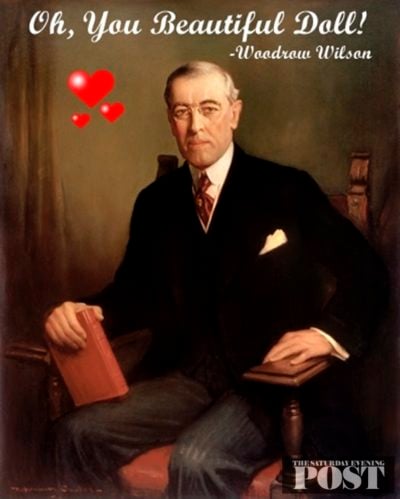
- When it comes to rating presidents by their love letters, Warren G. Harding’s name should have an asterisk beside it. He had a loveless marriage to Florence Kling De Wolfe, but he had plenty of love to express to Carrie Fulton Phillips. They started a 15-year affair in 1905, and he often wrote her passionate, explicit notes.Harding’s letters to Phillips—over 1000 of them—were made public in 2014. Harding was confident that she would burn them, as he directed her to do. “They are too inflammable to keep,” he wrote her. Unfortunately, she saved them, enabling future generations to be embarrassed for the late president.
My Carrie, Beloved and Adored, I do love you so… I wonder if you realize how much — how faithfully, how gladly… how passionately. Yes you do know the last, you must have felt the proof.
Honestly, I hurt with the insatiate longing, until I feel that there will never be any relief untiI I take a long, deep, wild draught on your lips and then bury my face on your pillowing breasts. Oh, Carrie! I want the solace you only can give. It is awful to hunger so and be so wholly denied…
Wouldn’t you like to get sopping wet out on Superior — not the lake — for the joy of fevered fondling and melting kisses? Wouldn’t you like to make the suspected occupant of the next room jealous of the joys he could not know, as we did in morning communion at Richmond?
- Harry Truman was as plain-spoken in love as in everything else. On December 21, 1911, wrote his girlfriend, Bess Wallace.
I suppose that I am too crazy about you anyway. Every time I see you I get more so, if it is possible. I know I haven’t any right to, but there are certain things that can’t be helped and that is one of them. I wouldn’t help it if I could, you know.
Writing from Berlin, 33 years later, Truman told 60-year-old Bess, whom he’d married in 1919, how much a long-distance call made him miss her.
It made me terribly home sick when I talked with you yesterday morning. It seemed as if you were just around the corner, if 6,000 miles can be just around the corner. I spent the day after the call trying to think up reasons why I should bust up the Conference and go home.
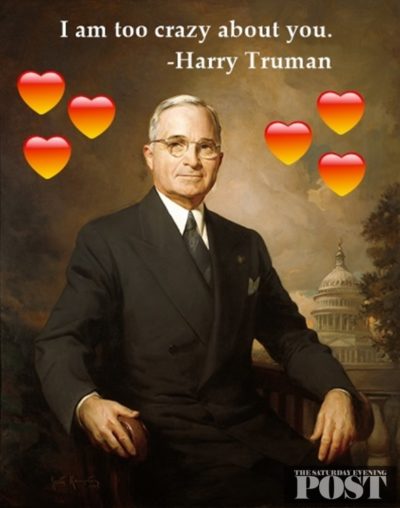
- When Richard Nixon fell for Pat Ryan, he fell hard. He proposed to her on their first date. When she didn’t accept, an undaunted Nixon agreed to drive her on dates with other men, just to be with her. And he wrote her love letters, like this undated example:
Every day and every night I want to see you and be with you. Yet I have no feeling of selfish ownership or jealousy. Let’s go for a long ride Sunday; let’s go to the mountains weekends; let’s read books in front of fires; most of all, let’s really grow together and find the happiness we know is ours.
- George H. W. Bush has never got over the thrill of marrying Barbara Pierce. On January 6, 1994, he wrote her:
Will you marry me? Whoops. I forgot you did that 49 years ago today. I was very happy on that day in 1945, but I’m even happier today. You give me joy that few men know. I’ve climbed perhaps the highest mountain in the world, but even that cannot hold a candle to being Barbara’s husband.
- But of all the presidents, the love-letter master was probably Ronald Reagan, who wrote highly romantic notes to his wife Nancy Davis throughout their marriage. On Valentine’s Day, 1960, he wrote her:
Feb. 14 may be the date they observe and call Valentine’s day but that is for people of only ordinary luck. I happen to have a “Valentine Life” which started on March 4 1952 [their wedding anniversary] and will continue as long as I have you. Therefore realizing the importance of this to me, will you be my Valentine from now on and for ever and ever? Ya see my choice is limited, a Valentine life or no life because I love you very much.
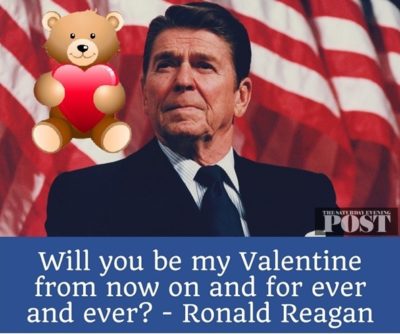
Kind but Final Words for President Harding
Recent paternity tests have brought Warren G. Harding back into the news. Genetic testing has now proven that Nan Britton told the truth in 1927 when she claimed she and Harding had been lovers, and that Harding was the father of her child.
She had written a book about their affair because, she claimed, Harding had promised to provide support for their daughter. But then he died, suddenly, in 1923 without making any provisions for the child. So The President’s Daughter was published, prompting cries of outrage from Harding’s supporters.
The Post never mentioned the affair, of course. The editors were strong supporters of Warren G. Harding back in those days. Harding needed friends. His administration had been blackened by scandal. Corruption in the Veterans Bureau prompted its director to flee to Europe and its general counsel to kill himself. Shortly afterward, the private secretary of the Attorney General, who’d been involved in subverting Prohibition laws, also shot himself. Meanwhile, the investigation into the Teapot Dome Scandal threatened to implicate the president.
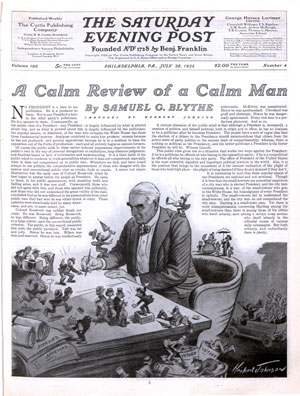
So it was with understandable pleasure that President Harding saw the Post article in the July 28, 1923, issue: “A Calm Review of a Calm Man.” As he rested in bed on August 2, recovering from illness and stress, he listened to his wife reading Samuel G. Blythe’s comforting words, “I think that as an American, as President, and as a human being, the Hon. Warren G. Harding hasn’t had and isn’t having fair treatment from all this gang of knockers, maligners, self-seeking politicians, disappointed applicants for his favor, theorists and fanatics and fools who want to reform the world in half an hour.”
Somewhere during the reading, Harding said, “That’s good! Go on — read some more.” They were the last words he ever spoke, for he suddenly died a few minutes later.
His death left many questions unanswered, such as his knowledge of the scandals that sent several members of his administration to jail. It also left the paternity of Nan Britton’s child in question. Until now.